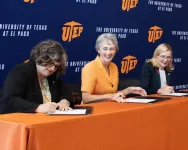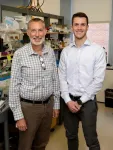(Press-News.org) In a study published July 29 in Advanced Materials, University of Texas at Dallas researchers found that X-rays of the kidneys using gold nanoparticles as a contrast agent might be more accurate in detecting kidney disease than standard laboratory blood tests. Based on their study in mice, they also found that caution may be warranted in employing renal-clearable nanomedicines to patients with compromised kidneys.
Before administering renal-clearable drugs, doctors routinely check a patient’s kidney function by testing their blood urea nitrogen (BUN) and creatinine (Cr) levels. With the increasing use of engineered nanoparticles to deliver payloads of drugs or imaging agents to the body, an important question is how the nanoparticles’ movement and elimination through the kidney is affected by kidney damage. Can traditional biomarkers like BUN and Cr accurately predict how well — or how poorly — such nanoparticles will move through the kidneys?
The UT Dallas researchers found that in mice with severely injured kidneys caused by the drug cisplatin, in which BUN and Cr levels were 10 times normal, nanoparticle transport through the kidneys was slowed down significantly, a situation that caused the nanoparticles to stay in the kidneys longer.
In mildly injured kidneys, however, in which BUN and Cr levels were only four to five times higher than normal, the transport and retention of gold nanoparticles couldn’t be predicted by those tests.
On the other hand, the amount of gold nanoparticle accumulation seen on X-rays did correlate strongly with the degree of kidney damage.
“While our findings emphasize the need for caution when using these advanced treatments in patients with compromised kidneys, they also highlight the potential of gold nanoparticles as a noninvasive way to assess kidney injuries using X-ray imaging or other techniques that correlate with gold accumulation in the kidneys,” said Dr. Mengxiao Yu, a corresponding author of the study and a research associate professor of chemistry and biochemistry in the School of Natural Sciences and Mathematics.
Chemistry and biochemistry research scientist Xuhui Ning BS’14, PhD’19 is lead author of the study, and Dr. Jie Zheng, professor of chemistry and biochemistry and a Distinguished Chair in Natural Sciences and Mathematics, is a corresponding author. Other contributors are affiliated with UT Southwestern Medical Center and Vanderbilt University Medical Center.
The research was funded by the National Institute of Diabetes and Digestive and Kidney Diseases, part of the National Institutes of Health (R01DK124881, R01DK115986, R01DK103363) and the Cancer Prevention and Research Institute of Texas (RP200233).
END
Better than blood tests? Nanoparticle potential found for assessing kidneys
2024-09-20
ELSE PRESS RELEASES FROM THIS DATE:
Texas A&M and partner USAging awarded 2024 Immunization Neighborhood Champion Award
2024-09-20
The Texas A&M University School of Public Health and USAging have been awarded the 2024 Immunization Neighborhood Champion Award by the U.S. Centers for Disease Control’s National Adult and Influenza Immunization Summit. Matthew Lee Smith, PhD, professor at the School of Public Health, leads the school’s involvement as a founding member of USAging’s Aging and Disability Vaccination Collaborative (ADVC).
Announced as respiratory illness season is ramping up in the United States, this honor recognizes Smith’s work in support of ADVC’s efforts ...
UTEP establishes collaboration with DoD, NSA to help enhance U.S. semiconductor workforce
2024-09-20
EL PASO, Texas (Sept. 20, 2024) – The University of Texas at El Paso today announced new collaborations with the Department of Defense (DoD) and the National Security Agency (NSA) that support research and training to strengthen the nation’s leadership in semiconductor, or microchips, technology.
NSA, the signals intelligence and cybersecurity agency for the United States, also recently named UTEP as an NSA Center of Academic Excellence in Cybersecurity Research, making UTEP one of only 11 universities nationwide to hold all three ...
Study finds family members are most common perpetrators of infant and child homicides in the U.S.
2024-09-20
Homicide is a leading cause of death among people 19 and younger in the United States, and firearms are used in a large proportion of these crimes. Although the homicide rate for this population declined in the 1990s and 2000s, it has increased every year since 2013, with a large spike during the COVID-19 pandemic.
Now, new research by Hannah Rochford, PhD, an assistant professor with the Texas A&M University School of Public Health, and two colleagues from the University of Iowa, provides insight into the characteristics of ...
Researchers secure funds to create a digital mental health tool for Spanish-speaking Latino families
2024-09-20
Cory Cobb, PhD, an assistant professor of health behavior at the Texas A&M University School of Public Health, is leading a research team that has been awarded a three-year grant from the National Institute of Mental Health to create an online platform for the intervention program they developed for United States-based Spanish-speaking Latino parents and their children.
The Latino Youth and Family Empowerment (LYFE) program focused on Nuestras Familias: Andando Entre Culturas (Our Families: Walking between Cultures), an intervention designed to enhance the parenting ...
UAB startup Endomimetics receives $2.8 million Small Business Innovation Research grant
2024-09-20
BIRMINGHAM, Ala. – The University of Alabama at Birmingham startup company Endomimetics, LLC, has received a $2.8 million Small Business Innovation Research Phase II grant from National Institute of Neurological Disorders and Stroke.
Under the grant, Endomimetics co-founders Ho-Wook Jun, Ph.D., a professor in the UAB Department of Biomedical Engineering, and Brigitta Brott, M.D., a professor in the UAB Department of Medicine Division of Cardiovascular Disease, will collaborate with Ramanathan Kadirvel, Ph.D., a professor of neurosurgery and radiology at Mayo Clinic, and David Kallmes, M.D., a professor of radiology at Mayo Clinic, Rochester, Minnesota, to develop a BionanomatrixTM ...
Scientists turn to human skeletons to explore origins of horseback riding
2024-09-20
As anyone who’s spent time in the saddle knows, riding a horse can be hard on your body. But can it change the way your skeleton looks?
The answer, according to archaeologists from the University of Colorado Boulder: It’s complicated. In a new study, the team drew on a wide range of evidence—from medical studies of modern equestrians to records of human remains across thousands of years.
The researchers concluded that horseback riding can, in fact, leave a mark on human skeletons, such as by subtly altering the shape of the hip joint. But those sorts of changes on their own can’t definitively reveal whether people have ridden ...
UCF receives prestigious Keck Foundation Award to advance spintronics technology
2024-09-20
UNIVERSITY OF CENTRAL FLORIDA
UCF Receives Prestigious Keck Foundation Award to Advance Spintronics Technology
The work could change the future of electronics, making them faster and more energy efficient.
ORLANDO, Sept. 20, 2024 – A team of researchers led by University of Central Florida Pegasus Professor of Physics Enrique Del Barco is working on a new project that could change the future of electronics, making them faster and more energy efficient.
The work is funded by a new $1.3 million award from the W.M. Keck Foundation, one of the nation’s ...
Cleveland Clinic study shows bariatric surgery outperforms GLP-1 diabetes drugs for kidney protection
2024-09-20
Cleveland Clinic Study Shows Bariatric Surgery Outperforms GLP-1 Diabetes Drugs for Kidney Protection
Bariatric surgery was shown to protect kidney function and reduce the risk of kidney failure in study participants when compared to GLP-1 medications
Friday, September 20, 2024, CLEVELAND: A Cleveland Clinic study showed that in patients with type 2 diabetes, obesity, and chronic kidney disease, bariatric surgery was associated with a significant decrease in the progression of chronic kidney disease compared to those who received GLP-1 diabetes medications. The paper was published in Annals ...
Study reveals large ocean heat storage efficiency during the last deglaciation
2024-09-20
As one of the largest heat reservoirs in the climate system, the global ocean absorbs more than 90% of the excess energy from ongoing anthropogenic warming. In the last century, the greatest warming in the ocean has occurred in the upper 500 m, with relatively weak warming in the deep ocean, corresponding to a small ocean heat storage efficiency of ~0.1.
Paleoceanographic observations, however, suggest that on long time scales, the deep ocean warming can be comparable to or larger than the surface ocean warming, with ocean heat storage efficiency during the last ...
Fever drives enhanced activity, mitochondrial damage in immune cells
2024-09-20
Fever temperatures rev up immune cell metabolism, proliferation and activity, but they also — in a particular subset of T cells — cause mitochondrial stress, DNA damage and cell death, Vanderbilt University Medical Center researchers have discovered.
The findings, published Sept. 20 in the journal Science Immunology, offer a mechanistic understanding for how cells respond to heat and could explain how chronic inflammation contributes to the development of cancer.
The impact of ...





